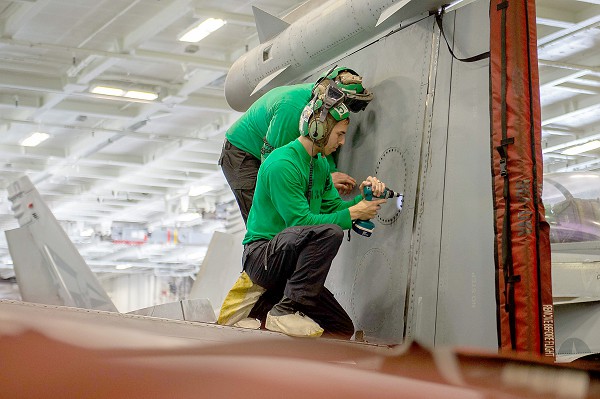
Pacific Ocean. (April 2, 2023): In this photo by MC3 Leon Vonguyen, Aviation Electronics Technician 2nd Class Garrett Fogg, from Augusta, Ga., conducts maintenance on an EA-18G Growler assigned to the “Gauntlets” of Electronic Attack Squadron 136 in the hangar bay aboard the Nimitz-class aircraft carrier USS Carl Vinson. The Carl Vinson is currently underway conducting Tailored Ship’s Training Availability/Final Evaluation Problem certification, a series of assessments of a crew’s ability to train themselves. When at sea, a carrier must make train its crew without any outside help. Crews are evaluated on their proficiency in warfighting, damage control including shipboard firefighting, simulated man overboard, abandon ship drills, and mass casualty events. Meanwhile, support units conduct replenishments-at-sea and do administrative reviews of crew performance.
Modern aircraft like the Growler are extremely complex and require great technical skill to maintain at peak efficiency. That is why one of the most vital Sailors onboard is the Aviation Electronics Technician. The ultimate jack-of-all-trades, these specialists are the consummate problem solvers, dashing between aircraft from tackling on issue after another. The aviation technician must know every aspect of the electrical systems on both fighters and helicopters, from engine wiring to navigation instruments, and be able to diagnose and fix problems “on the fly”. The job demands great attention to detail as these technicians work on flight-critical systems that impact passenger and crew safety.
The Growler’s mission is to jam enemy radars or to launch electronic countermeasures that blind their receivers to incoming attacking aircraft. As the Growler escorts fighters into combat, they either saturate enemy receivers with noise or send out false signals to deceive their radars. Theses complex systems must perform flawlessly, every time, to save pilots lives and accomplish the mission. The skill and experience of the Navy’s Aviation Electronics Technicians shine during evaluations like these.


